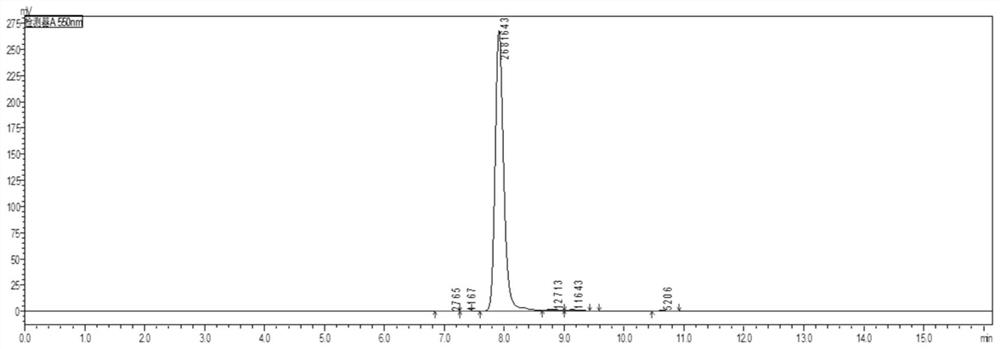The application of papaya saponin Ⅰ in the detection of lysosome
- Summary
- Abstract
- Description
- Claims
- Application Information
AI Technical Summary
Problems solved by technology
Method used
Image
Examples
Embodiment 1
[0049] The synthesis of embodiment 1 Polyphyllin I-Cy3
[0050] 1.1 Experimental steps
[0051] Synthesis steps of Polyphyllin I-Cy3: Weigh 5mg polyphyllin I (Polyphyllin I) and dissolve it in 0.5mL dimethylformamide (DMF, Shanghai Titan Technology Co., Ltd.), add 3.45mg Cy3-COOH (Ruixi Biological ), 1.34mg 1-(3-dimethylaminopropyl)-3-ethylcarbodiimide hydrochloride (EDC, Biide Pharmaceuticals) and 71.47μg 4-dimethylaminopyridine (DMAP, Adamas Reagent Co., Ltd. ) Dissolved completely (Paulus saponin Ⅰ: Cy3-COOH: EDC: DMAP = 1: 1.2: 1.2: 0.1 (molar ratio). Stir the reaction at 50°C for 6 h, and pass through a rotary evaporator (type YRE2000E, Yuhua, Gongyi City) Instrument Co., Ltd.) under the condition of 40 ℃ and 120r / min, the solvent was removed by rotary evaporation under reduced pressure, then washed 3 times with acetone, recrystallized with ethanol, and dried in vacuo to obtain the product. Using high performance liquid chromatography (HPLC, Hangzhou Xinqiao Bio Technol...
Embodiment 2
[0057] Example 2 Polyphyllin I-Cy3 targets lysosomes
[0058] 2.1 Experimental steps:
[0059] 2.1.1 Cell culture
[0060] Liver cancer HepG2 cells were purchased from the American Type Culture Collection (ATCC). At 37°C, 5% CO 2 Cultured in DMEM medium (Invitrogen) containing 10% (v / v) fetal bovine serum (Gibco) and 1% (w / v) penicillin / streptomycin (Invitrogen) in an incubator. When the cells are subcultured, first remove the original medium, wash it twice with PBS buffer, add trypsin (Gibco company) to digest the cells, and leave it in the cell incubator for about 1 min. If the cells have fallen off, add the medium to stop the digestion . The cells were blown down gently, centrifuged at 216g for 3min, the supernatant was removed, and the cells were resuspended in fresh DMEM medium containing 10% (v / v) fetal bovine serum and 1% (w / v) penicillin / streptomycin, The passage ratio was 1:4. The cells used for confocal observation were all cultured in confocal culture dishes (...
PUM
| Property | Measurement | Unit |
|---|---|---|
| diameter | aaaaa | aaaaa |
Abstract
Description
Claims
Application Information
 Login to View More
Login to View More - R&D
- Intellectual Property
- Life Sciences
- Materials
- Tech Scout
- Unparalleled Data Quality
- Higher Quality Content
- 60% Fewer Hallucinations
Browse by: Latest US Patents, China's latest patents, Technical Efficacy Thesaurus, Application Domain, Technology Topic, Popular Technical Reports.
© 2025 PatSnap. All rights reserved.Legal|Privacy policy|Modern Slavery Act Transparency Statement|Sitemap|About US| Contact US: help@patsnap.com



